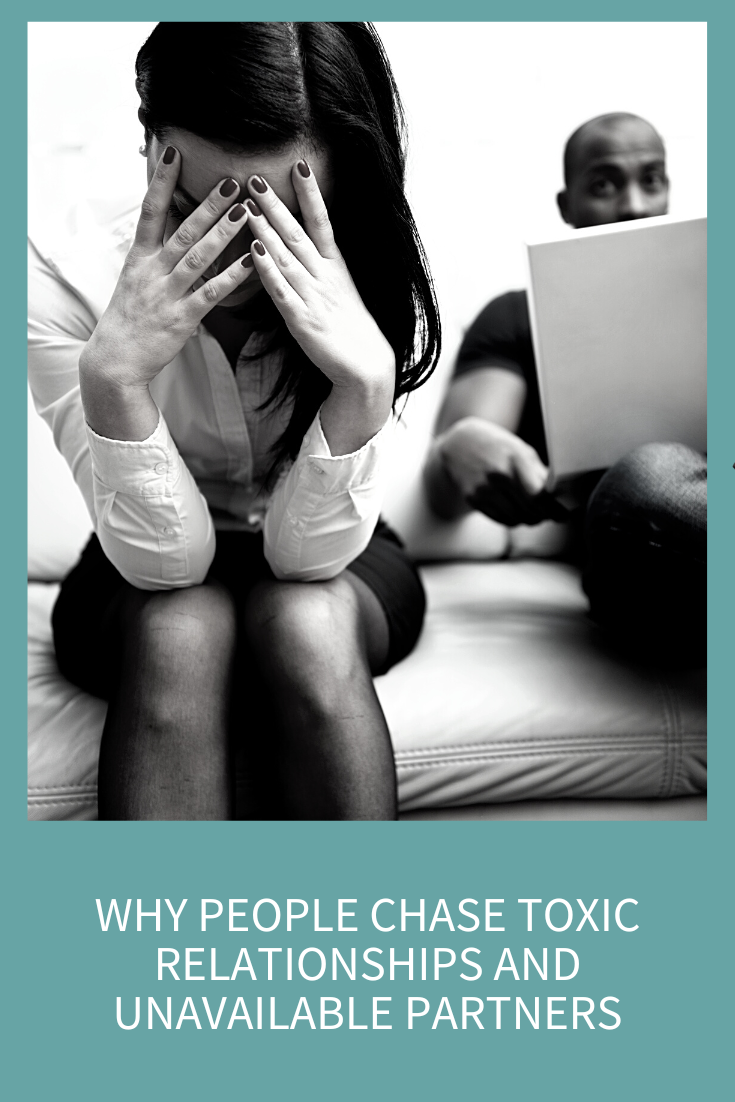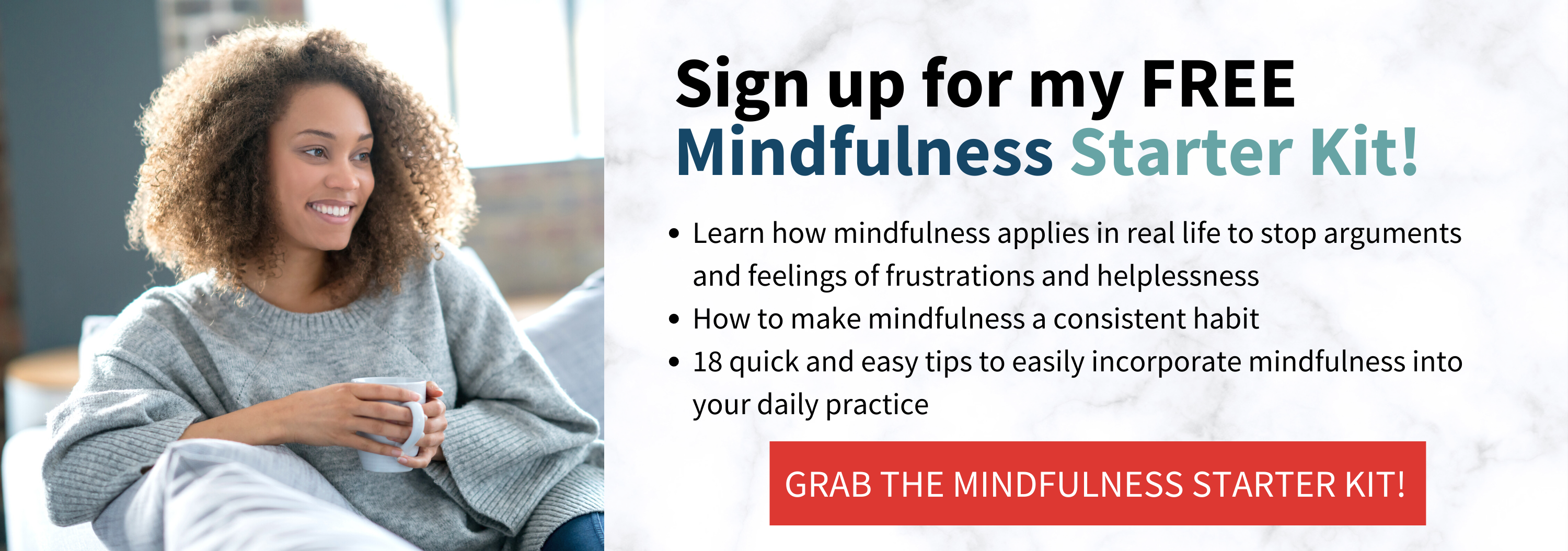
Why do we want to date people who are bad for us? Why do we get into relationships with people that bring out our worst, most unhealthy selves? Today I’m teaching you the top four reasons why you chase toxic relationships and unavailable partners and three tips to help you stop.
8-minute read
What is a Toxic Relationship?
At its core, a toxic relationship is one where you relate to the other person in some type of unhealthy, detrimental way. Toxic relationships are characterized by poor communication, an absence of mutual respect, and a lack of trust. In these types of relationships, there’s often minimization of feelings, gaslighting, conflict arising easily, not feeling supported, and other types of controlling behaviors.
Why Do We Chase Toxic Relationships or Unavailable Partners?
Reason #1: Childhood Trauma
How you were raised and parented shapes your perceptions of how relationships should work as well as your sense of self-worth and esteem. I generally refer to this as trauma, although people hate that word because they think it only applies to something violent, like physical or sexual abuse. But trauma also comes from neglect, unloving or cold parents, a critical caregiver, a lack of parenting, being from a divorced household, or not getting validation at important milestones. Any of these things can cause someone to look for love and affection, no matter the cost.
For example, if you were constantly criticized or judged as a kid, you’d likely end up with feelings of worthlessness and low self-esteem. In turn, this results in not feeling worthy of a healthy relationship or finding a partner who also criticizes you (isn’t that how someone shows they love you?). Maybe you even heard, “I’m just trying to tell you the truth to help you!”
You end up not trusting yourself, so look outside for guidance and leadership. You end up feeling powerless in your life and stay in cycles of toxicity as an adult. Likely your only sense of value comes from being in a relationship… any relationship.
In the same way, you might have grown up in a home with a lot of conflict or chaos. You then end up drawn to chaotic relationships as an adult. You might even say out loud, “I like a partner to fight with me; otherwise, I get bored and lose interest.”
Reason #2: Attachment
The research has consistently shown that how you attached to your parents or caregivers as a child affects how you connect in your adult relationships. Your attachment style affects everything from what romantic partners (and friends) you choose, what issues you’ll repeatedly face in your relationships, and even how your relationships will end. Simply put, attachment is the emotional bond you develop with another person, and it reflects the trust and security you feel in that relationship. The exact terminology used in Attachment Theory differs depending on who’s doing the research and what you’re reading, but they generally boil down to two main categories of attachment styles: Secure and insecure. The secure attachment style is the healthy one. If that were you, you wouldn’t be here with me right now because securely attached people aren’t interested in being in toxic relationships and don’t choose unavailable partners!
The insecure category is subdivided into two main styles: anxious and avoidant. Any person in a toxic relationship belongs in one of these two categories, although the reason they’re insecure might be more largely due to an underlying mental health issue as opposed to how they were parented.
Want to feel happier and more connected in your relationship? Buy my #1 bestselling book on Amazon, Be Happily Married: Even If Your Partner Won’t Do a Thing.
The Anxious Attachment Style
The anxious (also known as anxious-ambivalent or anxious-preoccupied) attachment type tends to worry extensively about their relationships. People with this style tend to be insecure about themselves, have low self-esteem, and have the need to be in relationships and rely on others. These folks are often clingy and needy, they analyze and overthink the meaning behind what others say and do, and they’re usually anxious and stressed about how they’re perceived. Anxiously attached people get easily emotionally dysregulated depending on other people’s moods which can also create more chaos as they try to fix and please.
The Avoidant Attachment Style
The avoidant (also known as the dismissive-avoidant or anxious-avoidant) is independent, confident, and self-sufficient (or at least that’s how they appear to be). People with this attachment style don’t want to rely on others; they want to be in control. They can be distant and aloof in relationships and aren’t likely to open up to others, especially when it comes to expressing private thoughts or emotions.
This is the classic “unavailable partner.” They avoid feelings at all costs, so they have a difficult time identifying, feeling, noticing, or expressing their true feelings. They tend to be more comfortable alone than with other people (especially their anxiously attached partners). They need to be in control of their environments so they can decide how much to let others in.
They can definitely be dismissive of other people’s thoughts and feelings and have overall commitment issues that show up in a variety of ways. That might be not wanting to commit to a long-term relationship or not being willing to live together or get married. Or, if they are married or living together, they might do things like keep their money separate, have separate friendships, and need more privacy than their partners.
Reason #3: Trauma bonding
Trauma bonding is basically a dysfunctional attachment. Trauma bonding gets hard-wired, so it lives in your nervous system, creating a hijacking of sorts. Because of your particular childhood, your brain has made neural associations between love and unhealthy behavior, and you end up with people who aren’t the best fit for you but feel unable to let them go. Trauma bonding does not mean that you’re bonding with another person over some shared trauma. Instead, it speaks to a bond that a survivor of some kind of abuse feels towards another person.
I’ve discussed trauma bonding at length, so be sure to check that out.
Reason #4: It’s Chemical
Biological anthropologist Helen Fisher and her neuroscientist colleagues did brain scans on people in love and found activity in the ventral tegmental area (or VTA), which is part of your brain’s reward system. Now, this part of your brain is way below your conscious, thinking brain, and it’s even below your emotions. It’s part of what’s called your Lizard or Reptilian brain. This is the part of your brain associated with motivation, wanting, desiring something, and that intense focus that happens when you’re craving something. This is the exact same part of the brain that’s stimulated when someone uses cocaine. They get the same rush and all those same feelings!
Addicts continue to use despite negative consequences and every part of their rational brain telling them to stop. Despite all the good reasons that any rational person would say, “Oh yes, you’ve got to stop,” the brain still obsesses about using. In this same way, your brain will focus on a relationship, even though it’s toxic or your partner is unavailable, and you’ll keep going back for more! There’s a certain feeling or “high” that you get in relationships, especially toxic ones or where your partner is distant, that’s similar to the brain patterns in something like a gambling addiction where there’s intermittent (or variable) reinforcement (the most powerful kind of reinforcement there is)! Sometimes things are bad, but every now and then, it’s good, and that’s enough to keep you hooked!
Are You in a Toxic Relationship?
You still might be wondering if you’re in a toxic relationship. If you’re still unsure, I would ask you these questions to help you decide:
- How does your partner make you feel most of the time?
- Is your partner there for you in a real and meaningful way?
- Do you feel like your partner has your back and would make decisions in your best interest over their own?
Tips for Dealing with Toxic Relationships and Unavailable Partners
1. Stop Talking about it
It’s time to stop talking about your relationship. Every time you complain, question, or romanticize, you’re creating strong emotions. Getting into these emotional or “feeling states” trigger strong brain chemicals that keep you stuck and going back for more. (This happens with drugs too. When people romanticize their use or talk about it over and over again, it just reinforces their cravings).
2. Make a List of Why Not
Create a list of “Why Not.” This is a written list of all the ways you’re not a good match. This is not a list of all the things you hate about them – hate is just love disguised. Instead, it’s a list of the ways that you’re just not a good fit. It’s more about how you like X, and they don’t. Then, I want you to save this list somewhere it’s easy to access because that impulse to contact them could happen anywhere, anytime, and that’s exactly when you need to pull out your list!
3. Focus on Yourself
If you’re in this type of relationship, it’s time to focus on yourself. Get professional help to deal with the reasons you’re in this relationship in the first place, work on your self-esteem, and building your confidence as a primary goal. Every time you catch yourself thinking of what your partner needs to do, stop and ask yourself what you need to do to focus on yourself and make changes.
Resources for Why People Chase Toxic Relationships and Unavailable Partners
How Childhood Trauma Affects Relationships
You Might Not Recognize You’re Suffering from Unhealed Trauma
How Your Attachment Style Affects Your Personal Relationships
Are You Trauma Bonding in Your Relationship and Don’t Realize It?
How Your Lizard Brain is Keeping You Stuck
Eight Ways to Build Your Confidence and Self-Esteem







